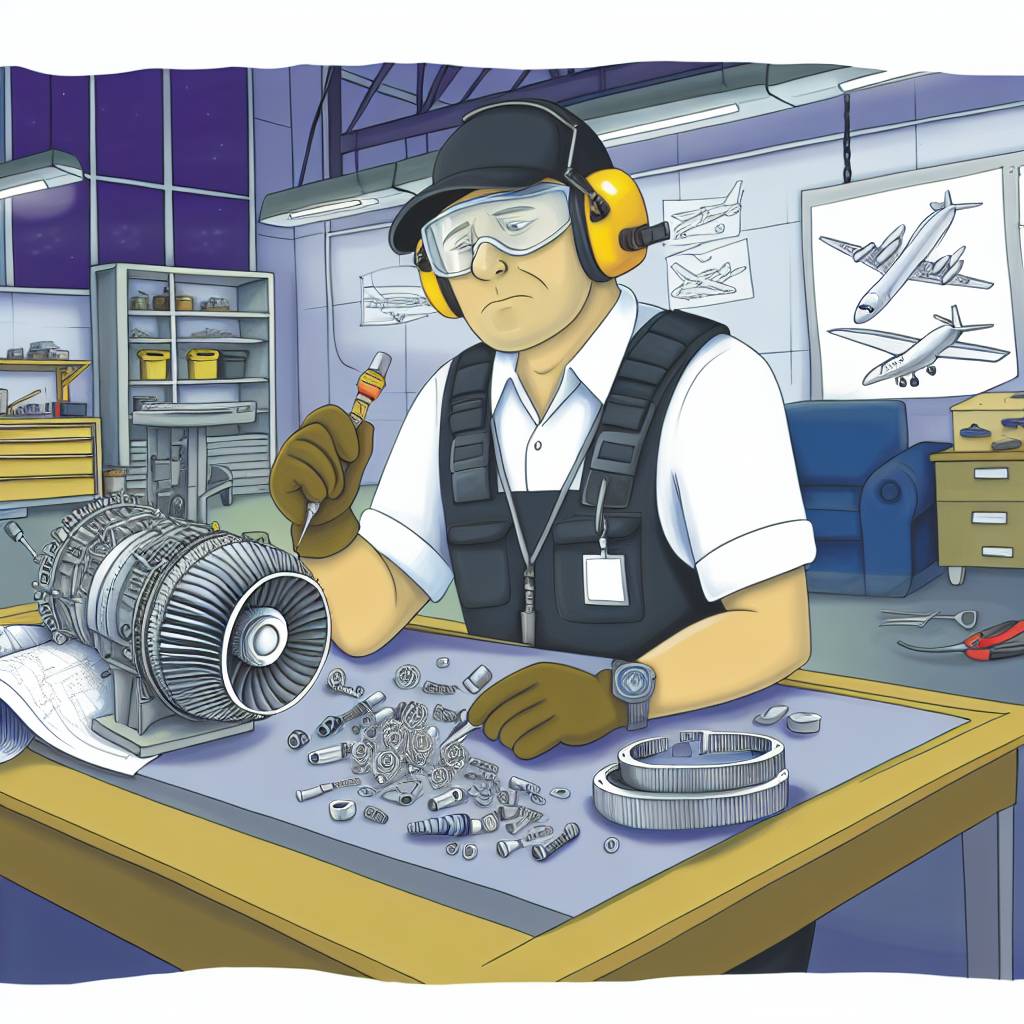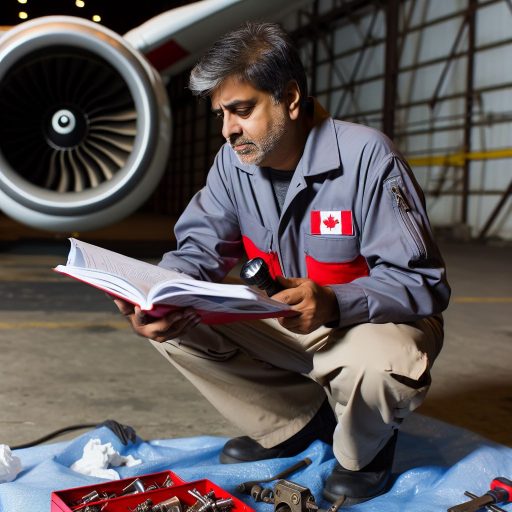Understanding the Role and Responsibilities of an Aviation Maintenance Technician
Overview of Responsibilities
An aviation maintenance technician ensures aircraft safety and functionality.
This role includes inspecting, repairing, and maintaining aircraft systems.
Additionally, technicians address issues related to engines, hydraulics, and electronics.
Regulatory Compliance
Technicians must comply with federal aviation regulations.
They should stay informed about updates in safety standards.
Documentation of maintenance and repairs is essential for compliance.
Technical Skills and Training
Aviation maintenance technicians require strong technical skills.
They must understand various mechanical and electronic systems.
Formal training programs and certifications are vital for employment.
Continuous education ensures they remain updated on new technologies.
Collaboration and Communication
Technicians often work in teams to solve complex problems.
Effective communication skills are crucial in this environment.
Collaboration ensures comprehensive checks and accurate reporting of issues.
Tools and Equipment
The role requires proficiency with various tools and equipment.
Technicians use diagnostic devices to identify issues efficiently.
Proper tool maintenance prolongs their lifespan and ensures safety.
Essential Skills and Qualifications Required for Success in Aviation Maintenance
Technical Skills
Aviation maintenance technicians need strong technical skills.
They should understand aircraft systems and components thoroughly.
Furthermore, these professionals must be capable of diagnosing issues accurately.
Hands-on experience with tools and equipment is also critical.
Considerable knowledge of aviation regulations is necessary.
Communication Skills
Effective communication is vital in this field.
Technicians must explain problems and solutions clearly.
They should collaborate with other professionals and team members.
Documentation of maintenance work is essential for clarity.
Unlock Your Career Potential
Visualize a clear path to success with our tailored Career Consulting service. Personalized insights in just 1-3 days.
Get StartedIn addition, the ability to listen actively improves teamwork.
Problem-Solving Abilities
Strong problem-solving skills help technicians excel.
They need to evaluate complex situations and identify solutions.
Creativity in finding effective fixes can significantly enhance performance.
Moreover, quick decision-making is essential in emergencies.
Physical and Mental Dexterity
Working on aircraft requires physical fitness and agility.
Technicians often maneuver in tight spaces and use heavy equipment.
Good hand-eye coordination aids in precision work.
Mental sharpness is equally important for troubleshooting effectively.
Education and Certifications
A solid educational background is crucial for aviation maintenance technicians.
A degree or diploma in aviation maintenance is recommended.
Industry certifications, such as an Airframe and Powerplant (A&P) license, are necessary.
Continuous learning and staying updated on technology is vital.
Experience Requirements
Practical experience enhances skills significantly.
Internships or entry-level positions provide invaluable hands-on training.
Mentorship from experienced technicians can offer guidance.
Over time, gaining diversified experience can broaden career opportunities.
Gaining Relevant Certifications and Licenses: A Step-by-Step Guide
Understanding the Importance of Certifications
Certifications enhance your credibility as a technician.
They demonstrate your commitment to the aviation industry.
Moreover, they may improve your job prospects.
Employers value well-qualified applicants with certifications.
Researching Certification Requirements
Start by exploring local aviation regulations.
Determine the certifications relevant to your desired role.
Contact industry associations for guidance on certifications.
Online resources can also provide valuable information.
Choosing the Right Certification Program
Select certified training programs that meet regulatory standards.
Consider programs endorsed by reputable organizations.
Read reviews from past students to gauge program effectiveness.
Evaluate the curriculum to ensure it covers essential skills.
Preparing for Certification Exams
Gather study materials early for an effective review.
Join study groups to discuss challenging topics with peers.
Take practice exams to familiarize yourself with the format.
Schedule a quiet time for focused study sessions.
Applying for Required Licenses
After passing your exams, submit your certification applications.
Ensure all documents are accurate and complete.
Be prepared to pay associated fees for certification processing.
Follow up on your application status regularly.
Maintaining Your Certifications
Stay informed about continuing education requirements.
Participate in workshops and seminars to gain new knowledge.
Renew your certifications before they expire to stay compliant.
Networking with other professionals can help you stay updated.
You Might Also Like: How to Land Your First Job in Supply Chain Management
Building a Strong Foundation in Aircraft Systems and Components
Understanding Aircraft Systems
Aircraft systems are complex networks that ensure safety and efficiency.
Each system has a specific function crucial to flight operations.
Therefore, mastering their operations is essential for aviation technicians.
Start with the fundamental systems, like propulsion and electrical systems.
Explore how these systems work together during a flight.
Learning Key Components
Components of aircraft systems play vital roles in overall functionality.
Begin with engines, landing gear, and navigation systems.
Every component serves a unique purpose in aircraft safety.
Familiarize yourself with common issues associated with these components.
Hands-on experience enhances understanding significantly.
Importance of Maintenance Protocols
Following maintenance protocols ensures aircraft reliability.
Regular inspections can prevent costly repairs and ensure safety.
Technicians must be diligent in documenting maintenance activities.
Proper documentation supports compliance with aviation regulations.
Utilizing Technical Manuals
Technical manuals are valuable resources for technicians.
These manuals provide detailed information about systems and components.
Learning to navigate manuals effectively improves troubleshooting skills.
Consulting these resources can enhance your technical knowledge.
Staying up-to-date with changes is crucial in this evolving field.
Developing Problem-Solving Skills
Problem-solving is a critical skill for aviation maintenance technicians.
Analyzing issues leads to accurate diagnostics and effective repairs.
Practice scenarios can improve your problem-solving abilities.
Collaborate with experienced technicians for insights on complex problems.
Hands-On Experience is Key
Real-world experience is irreplaceable in aviation maintenance training.
Participate in internships or apprenticeships to gain practical knowledge.
Engaging with experienced professionals helps build confidence.
Shadowing seasoned technicians can offer valuable learning opportunities.
Staying Current with Industry Technologies
The aviation industry constantly evolves with new technologies.
Regular training and certifications keep your skills relevant.
Attend workshops and seminars to stay informed about advancements.
Networking with peers provides insights on emerging trends and tools.
Explore Further: How to Optimize Fleet Operations for Canadian Managers
Staying Updated with Industry Standards and Technological Advancements
Importance of Continuous Learning
Continuous learning is essential for aviation maintenance technicians.
New technologies emerge regularly in aviation.
Staying current enhances your skill set and career prospects.
Participating in Professional Organizations
Joining professional organizations can expand your knowledge base.
Organizations like the Aircraft Maintenance Technicians Association provide valuable resources.
Engaging with peers fosters networking opportunities.
Attending Workshops and Conferences
Workshops and conferences present hands-on learning experiences.
Many events cover recent technological advancements.
These gatherings also offer access to industry experts.
Utilizing Online Resources
Various online platforms provide courses specifically for aviation technology.
Webinars are accessible and convenient learning options.
Online forums enable discussions with experienced technicians.
Keeping Up with Regulatory Changes
Aviation regulations change frequently.
Regularly review updates from the FAA and EASA.
Understanding regulations helps ensure compliance in your work.
Adopting New Technologies
Technological advancements transform the aviation maintenance field.
Familiarize yourself with the latest tools and software.
Implementing new technologies can enhance efficiency and safety.
Building Good Relationships in the Industry
Networking with experts helps you learn about best practices.
Strong relationships promote collaboration and knowledge-sharing.
Maintain connections to benefit from industry insights.
See Related Content: Qualities That Make a Great Aviation Maintenance Technician
Developing Strong Problem-Solving and Critical Thinking Skills
Importance of Problem-Solving Skills
Problem-solving skills are crucial for aviation maintenance technicians.
They enable technicians to address aircraft issues efficiently.
Moreover, these skills enhance safety and reliability within the industry.
Ways to Improve Problem-Solving Skills
Participate in hands-on training programs continuously.
Engage in simulations that mimic real-world aircraft maintenance scenarios.
Additionally, seek feedback from experienced colleagues regularly.
Join industry workshops and conferences to expand your knowledge.
Utilizing Analytical Tools
Leverage analytical tools and software for diagnosing problems.
This practice facilitates quick identification of issues.
Additionally, it helps in developing a systematic approach to maintenance tasks.
Building Critical Thinking Skills
Critical thinking assists technicians in evaluating complex scenarios.
It involves analyzing information from various sources.
Consequently, technicians make informed decisions based on evidence.
Techniques for Developing Critical Thinking
Regularly practice reflective thinking after completing tasks.
Ask questions that challenge your understanding of maintenance procedures.
Engage with peers in discussions about best practices and techniques.
Collaborating with Others
Collaboration enhances problem-solving capabilities.
Working with a team leads to diverse perspectives on challenges.
Furthermore, it fosters a supportive environment for knowledge sharing.
Establishing an Open Communication Culture
Encourage open dialogue among team members about maintenance processes.
This shared communication leads to improved troubleshooting methods.
Additionally, it strengthens teamwork in resolving complex issues effectively.
Staying Updated with Industry Trends
Keeping abreast of the latest aviation technology is vital.
Regularly read industry publications and attend relevant training.
Also, follow influential figures on social media for insights.
Networking Opportunities
Establish connections with professionals in the aviation sector.
Networking exposes you to different problem-solving approaches.
Moreover, it can lead to potential mentorship opportunities.
Uncover the Details: The Journey to Becoming a Licensed Maritime Pilot

Networking and Building Professional Relationships within the Aviation Industry
The Importance of Networking
Networking plays a crucial role in career advancement.
It helps aviation maintenance technicians connect with industry professionals.
Moreover, it opens doors to new job opportunities and collaborations.
Building relationships fosters trust and credibility in the field.
Utilizing Industry Events
Attending aviation conferences is vital for networking success.
These events provide platforms for meeting potential employers and colleagues.
Additionally, they offer workshops to enhance technical knowledge.
Engagement in panel discussions aids in gaining industry insights.
Engaging on Social Media
Social media platforms connect aviation professionals globally.
LinkedIn is particularly effective for establishing professional profiles.
Joining relevant groups promotes discussions and knowledge sharing.
Sharing articles and achievements increases visibility within the community.
Building Relationships with Colleagues
Fostering good relationships with coworkers enhances teamwork.
Collaboration on projects often leads to innovative solutions.
Regular communication keeps everyone aligned and motivated.
Offering support to peers builds a positive work environment.
Joining Professional Organizations
Membership in professional organizations is beneficial for career growth.
These groups often organize events, training sessions, and workshops.
Networking opportunities arise through association events and conferences.
Participating in committees can increase your visibility and influence.
Mentorship Opportunities
Finding a mentor in the aviation industry is invaluable.
A mentor can provide guidance and share their experiences.
Learning from their successes and challenges accelerates your growth.
Seek out mentorship programs within professional organizations.
Pursuing Continued Education and Training Opportunities
The Importance of Ongoing Education
Continued education enhances your skills and knowledge as an Aviation Maintenance Technician.
Staying updated with the latest technologies is crucial in aviation.
Furthermore, it allows you to understand evolving regulations and standards.
Exploring Formal Training Programs
Look for accredited institutions offering programs in aviation maintenance.
Programs often provide hands-on experience with modern aircraft systems.
Consider enrolling in specialized courses focused on your area of interest.
Certification and Licensing
Obtain relevant certifications to enhance your career prospects.
Various certifications add credibility and show your commitment to the industry.
Examples include FAA Airframe and Powerplant (A&P) certification.
Attending Workshops and Seminars
Participate in industry workshops to gain practical experience.
Networking at seminars helps you connect with industry professionals.
Additionally, workshops provide insights into the latest maintenance techniques.
Utilizing Online Resources
Take advantage of online courses and webinars for flexible learning.
Many organizations offer free or low-cost online resources.
These resources cover a wide range of aviation maintenance topics.
Joining Professional Associations
Membership in a professional association can offer numerous benefits.
Associations often provide access to exclusive training opportunities.
Networking through these organizations can open new job opportunities.
Staying Informed about Industry Trends
Regularly read industry publications to stay current on trends.
Following relevant blogs and news sites is beneficial for continuous learning.
Additionally, many organizations share updates about regulatory changes.
Practicing Safety Procedures and Best Practices in Maintenance Operations
Understanding the Importance of Safety
Safety is paramount in aviation maintenance.
It safeguards technicians and ensures aircraft reliability.
Regular training enhances awareness and reduces risks.
Implementing Safety Procedures
Adhering to established safety protocols is crucial.
All personnel must know emergency procedures.
Conduct regular safety drills to reinforce training.
Using Personal Protective Equipment (PPE)
PPE is essential for any maintenance operation.
Always wear the appropriate gear for the task.
Common PPE includes gloves, goggles, and helmets.
Maintaining a Clean Work Environment
A clean workspace promotes safety and efficiency.
Regularly inspect tools and equipment for damage.
Organize materials to prevent accidents and errors.
Staying Updated with Regulations
Federal Aviation Administration (FAA) regulations guide maintenance practices.
Technicians must stay informed about changes in regulations.
Attend workshops and seminars to keep knowledge current.
Documenting Maintenance Procedures
Accurate documentation is key in aviation maintenance.
Record all maintenance actions thoroughly and timely.
This ensures accountability and helps trace issues effectively.
Conducting Pre- and Post-Maintenance Inspections
Inspections are vital before and after maintenance tasks.
Pre-maintenance checks ensure readiness and safety.
Post-maintenance inspections verify that all systems function correctly.
Promoting a Safety Culture
A strong safety culture benefits everyone in the workplace.
Encourage open communication regarding safety concerns.
Recognize and reward safe behaviors among team members.
Continuous Training and Education
Regular training sessions reinforce safety knowledge.
Use real-life scenarios to enhance learning experiences.
Encourage technicians to pursue further certifications.
Additional Resources
2022 Women in Aviation Advisory Board Report
Aircraft Maintenance Engineer : RRC Polytech: Program Explorer




